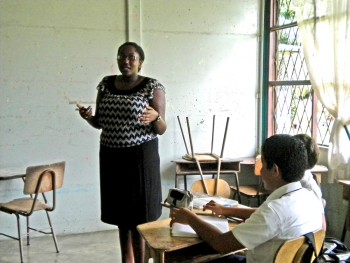Expanding English Literacy

Ivana Evans '12 teaching an English lesson in a Costa Rican elementary school.
Details
As an American in rural Costa Rica, Ivana Evans has had to deal with many adults assuming she has more money than she actually does and asking her to buy them expensive things. However, her experience with the children she is teaching has been the complete opposite. Even though they have seen Evans with her iPod and digital camera, they insist on buying things for her. "Some of these kids come from families that can't afford notebooks or even shoes for school," she says, "but they find it in their hearts to offer to buy me candy and snacks."
Evans, a Spanish major and education minor, is interning through the El Ceibo Costa Rican Immersion Program, teaching English at a small elementary school that currently has no English program. She is examining the issue of English literacy, the difficulty of gaining it due to lack of teachers, and the opportunities it can afford.
Evans has learned the value of connecting with her students. "In education courses, we talk about this all the time," she says, "but living its importance has shown me how powerful a teacher's effect can be by simply getting to know his or her students, what they need, and why they feel it's important that they learn what the teacher is teaching."
The most powerful part of her internship, which is funded by the Center for Peace and Global Citizenship, has been her experience teaching English to her host family's 6-year-old daughter, Konsi. Unlike in the classroom, Evans doesn't use books or chalkboards with Konsi—she just talks to her and plays with her. From these activities alone, Evans has witnessed Konsi's English improving every day.
"I have always said that education is life, which means that learning doesn't only happen in a classroom or only within a specified time period," she says. "That fact was confirmed here, living and learning with Konsi."
Evans plans to apply this concept of natural learning to the classroom setting through games and discussions that may not be English-focused but will encourage her students to ask "What does that mean?" or "How do you say that in English?" During these "living activities," Evans will ask the same questions of her students in order to both improve her Spanish and show her students that they are also her teachers.
Evans has known for a long time that she wants to become a teacher, but this internship has shown her that she also wants to be a future student. "It has made me realize that there is so much that I don't know and that that awareness helps me gain the trust of my students," she says. "So even when I'm a professional teacher, I want to keep that student spirit."
--Heather Harden '11



